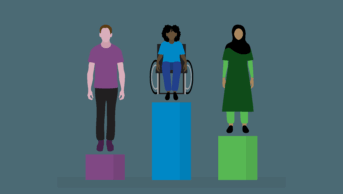
Wes Mountain/The Pharmaceutical Journal
‘Inclusive pharmacy practice’ (IPP) is an initiative launched in 2020 by the chief pharmaceutical officer (CPhO) at NHS England, in collaboration with the Royal Pharmaceutical Society (RPS), Association of Pharmacy Technicians UK (APTUK) and 13 other national stakeholder organisations. It is aimed at addressing health inequalities in England and creating an inclusive environment within pharmacy professions by promoting leadership that reflects the diversity of the professions and the communities served.
IPP has been developed to align with the seven priorities of NHS England’s ‘Equality, diversity and inclusion (EDI) improvement plan‘, covering recruitment, talent management, leadership and accessibility. Studies have shown that diverse teams outperform others in creativity, problem-solving and decision-making. This initiative is a response to the urgent health needs of underserved communities and is also part of a broader movement towards greater equity in healthcare delivery.
The IPP delivery group leads the work at NHS England to improve diversity in senior pharmacy professional leadership, exploring the steps needed to advance equity in the professions further. Much of the project work is driven by the CPhO clinical fellows, with oversight from the Pharmacy Advisory Group (PAG), or senior pharmacy professional leadership group in NHS England, ensuring alignment at national and regional levels. The group is based in CPhO office, but only serves the pharmacy profession.
Traditional recruitment methods are susceptible to unconscious bias, which can hinder diversity and perpetuate historical patterns
To review the development and impact of the IPP delivery group, we identified four important focus areas based on NHS England’s ‘No more tick boxes’ report — data, accountability, talent management and leadership — and published an IPP delivery plan. These pillars shape IPP’s strategic approach to promoting inclusivity across the pharmacy professions.
Data
The ‘Pharmacy workforce race equality standard (PWRES) report‘, which the group produced in 2023, highlights significant disparities in workforce representation and staff experiences. Black and minority ethnic (BME) colleagues reported higher instances of discrimination and limited access to career progression. To address these gaps, two databases — staff experience surveys and electronic staff records — were used to track workforce diversity and staff experience in underrepresented communities. One region has also developed a regional manifesto for driving change with another in consultation.
These efforts are aimed at improving diversity in senior leadership representation and reducing health inequalities while enhancing patient care. A crucial challenge in this process is the incomplete data in electronic staff records (ESR). To address this, managers are now being encouraged to review ESR data during annual appraisals, fostering a culture where protected characteristics, including ethnicity, are openly shared and accepted.
Accountability
In March 2024, we developed an inclusive recruitment checklist to enhance diversity in senior leadership within the pharmacy profession, in line with NHS England’s inclusive recruitment guidance. Traditional recruitment methods are susceptible to unconscious bias, which can hinder diversity and perpetuate historical patterns. The checklist seeks to mitigate bias by focusing on competency, ensuring recruitment is based on merit rather than demographics. User testing and feedback from NHS providers and integrated care boards led to a revised version, which was shared in April 2024. Ongoing evaluation will involve further feedback from recruiters and analysis of diversity data.
We also designed an inclusive expression of interest process to broaden participation in nationally led pharmacy and medicines boards, committees and groups. Traditionally, these groups were formed by selecting individuals known to organisers, which risked including only a narrow range of perspectives. The new process seeks interest from a wide pool of candidates, with each candidate providing a short statement detailing how their knowledge, skills and experience align with predefined criteria. A diverse panel then independently score anonymised statements using an objective matrix, ensuring selections are based on merit rather than personal connections or appearance.
Leadership
A reverse mentoring programme was launched within PAG to bridge diversity and inclusion gaps by pairing clinical fellows with senior pharmacy leaders. These pairings allow leaders to gain insights into the challenges faced by underrepresented groups and improve their allyship. Applicants outlined their goals and pairings were made.
The success of IPP will ultimately depend on how deeply inclusivity is embedded within every aspect of the professions
The introductory session covered psychological safety and included advice from guest speakers who had previously been reverse mentored. Early evaluations have shown positive outcomes, with senior leaders reporting thought-provoking discussions and a deeper understanding of allyship. Further evaluations will assess whether these changes in allyship positively impact the systems in which participants work.
Talent management
In response to the PWRES report, the IPP team developed a talent management resource tool to support equal access to career progression and improve diversity in senior pharmacy leadership. The tool offers a centralised platform for development opportunities, including leadership frameworks, fellowships and mentoring schemes. Target audience details, such as whether they are a pharmacist or pharmacy technician, and timelines are provided to guide users.
The tool can be used in various professional settings, such as during performance and development reviews, to support individual growth. Regular reviews ensure it remains relevant and meets the evolving needs of pharmacy professionals.
The IPP initiative represents a pivotal step toward embedding diversity, equity and inclusion within the pharmacy professions. By aligning its goals with NHS equality, diversity and inclusion (EDI) improvement plan, the IPP delivery group has made significant strides in the four pillar areas, helping to create a more representative leadership within the profession.
However, challenges remain, particularly in addressing unconscious bias, ensuring equitable career progression and raising awareness across all sectors of pharmacy, regardless of role or setting. The success of IPP will ultimately depend on how deeply inclusivity is embedded within every aspect of the professions and how well it is supported and embedded by employers and current professional leaders. A truly diverse leadership will not only enhance the quality of care but also equip the pharmacy professions to better meet the evolving needs of the patients and communities.
Kaniksha Aggarwal, Wasim Baqir, Rebecca Burgoyne, Richard Cattell, Amira Chaudry, Kieran Hand, Amna Khan-Patel, Sinéad Peare, Sue Ladds, Natasha Lal, Maria Nasim, Shyaam Teli, Nisha Thakrar, Ashifa Trivedi, all members of the the IPP delivery group


